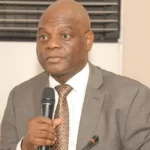By Adagher Tersoo
Education is said to be globally accepted as a sector that occupies an important place in the scheme of things for any nation with specific reliance on the tertiary education sub-sector for critical manpower needed in all sectors for development and industrialization. These tertiary institutions are responsible for the development of human capital through the advancement of knowledge, skills, and other competencies.
While the global trend tilts towards digital and innovative knowledge to tackle global challenges in accordance with the United Nation’s Sustainable Development Goals, Nigeria as a nation is still far from attaining this goals which is the reason why the Tertiary Education Trust Fund (TETFUND), created by government with the primary mandate of rehabilitating, restoring and consolidating tertiary education in Nigeria through funding and project management is assiduously working with relevant stakeholders with a view to reposition the tertiary education sub-sector to meet global best practices.
At a recent interactive session on emerging issues on interventions with Unions of beneficiary institutions, universities, polytechnics, and colleges of education organized by the Fund in Abuja, the Executive Secretary of TETFUND, ARC. Sonny Echono said it became necessary to proactively and consistently engage the stakeholders against the backdrop of prevailing challenges and to sustain the steady growth and development of the tertiary education sub-sector.
According to him, the interactive session was also an opportunity to create an enabling environment towards understanding some of the challenges and difficulties in the delivery of quality education in the nation’s tertiary institutions and also make meaningful contributions to the successful execution of the objective of the Fund. Other reasons given by Echono were the need to discuss with the unions towards mitigating incidences of industrial disputes in the tertiary education sector, look at ways to prevent and avoid their occurrences as well as to build and solidify cooperation and collaboration between the Fund, its beneficiary institutions and the Unions on matters that affect the growth and development of tertiary education in Nigeria.
The TETFUND Chief Executive identified the role of unions to be of great significance not only in the development of our tertiary institutions but indeed the entire education sector and the country itself through their various activities and contributions. He held the view that unions such as ASUU, ASUP, COEASU and the non-teaching unions NASU, SSANU and NAAT among others remain stakeholders that should be encouraged. To him, it is because the Fund recognizes the role of the unions in the development of education that it constantly engages them in its interactive activities to find common grounds on issues of mutual interest and benefits.
“It is a fact that issues related to industrial strike affect the development of education in the country. Studies have shown a link between poor student performance and industrial strike by unions. The arguments generally are that the quality of teaching and learning will significantly improve when teaching and learning are uninterrupted. Furthermore, building world class institutions requires a consistent and regular academic calendar and this is often affected by industrial strikes. However, a closer look will also show that many industrial strikes by the unions were for the improvement in teaching and learning conditions for both staff and students”.
Recall that part of TETFUND’s mandate is the provision of essential physical infrastructure for teaching and learning; provision of instructional materials and equipment; Research Book Development and Journals Publication; Academic Staff training and development as well as any other need, which in the opinion of the Board of Trustees, is critical and essential for the improvement of quality and maintenance of standards in higher educational institutions.
With the 3% Tertiary Education Tax paid by all registered companies operating in Nigeria, the Fund administers, manages, disburses, and monitors the judicious utilization of the proceeds. Some of the significant areas the Fund has recorded laudable achievements under its various intervention lines since its establishment include infrastructural projects across Universities, Polytechnics and Colleges of Education that range from classrooms, theatres, to halls and laboratories. It has equally provided sponsorship to thousands of scholars and lecturers across tertiary institutions in Nigeria for academic staff training and development as well as conference/workshops attendance both locally and overseas. It has further equipped and sponsored the publication of books and manuscripts and provided grants to scholars and lecturers under both the NRF and IBR grants.
Commending TETFUND on its delivery of mandate so far under the current leadership was the President of the Academic Staff Union of Universities (ASUU), Professor Emmanuel Osodeke who charged the Fund to concentrate more on the monitoring of its projects across the country following the abysmal performance of some of the beneficiary institutions after release of funds also raised the need for TETFUND to apply sanctions on non-performing institutions.
He however reiterated that unless the right thing is done, the Union will continue to embark on strike until the right thing is done in the nation’s tertiary institutions.
His counterpart from the Senior Staff Association of Nigerian Universities (SSANU) described TETFUND as a life wire in the operations of the nation’s educational system, especially the tertiary education sub-sector and called for an extension of the intervention programmes of the Fund to non-teaching staff of the university system. According to him, universities are for teaching, research and community service and non can operate successfully on the delivery of its mandate without ensuring that both teaching and non-teaching staff are comfortable to discharge their duties without hinderances.
“Training, re-training and staff development is something that does not need to be debated on. Our academic colleagues who drive the vehicle and ensures that the job is done clearly requires the support, cooperation and input of the non-teaching staff; mainly those in administration and other professional cadre. So when we see ourselves been kept aside and denied access to TETFUND interventions in terms of training and re-training, we feel short-changed. Arch Echono has started a good job and it takes a man who knows his onions to open up and ask people to discuss about what he does in his function”.
“We are not competing with anyone but what we require from you is to open up a space to accommodate all because if you have very good academics and you have others who do not perform their jobs in the administrative cadre, you have achieved nothing. Today, if you visit any university, from the gate, whether you are a student or you are a visitor or parent, the first person point of call is the non-teaching staff so there is no arguing the fact that no one needs training better than us”.
Immediate past President of the Nigerian Labour Congress (NLC), Comrade Ayuba Wabba who was the Keynote Speaker at the interactive session also commended the leadership of the TETFUND under Arc. Sunny Echono for its stringent commitment to the elevation of university education and experience for both lecturers, non-academic university workers and the student population in various campuses all over the country.
In his words “I commend the leadership of the TETFUND under Arc. Sunny Echono for his commitment to excellent service delivery. It takes a man of steel, integrity, and altruism to engage the unions in this kind of lesson learning and institutional improvement process. We certainly need more people like you and members of your team at the helms of our public institutions”.
“I must also very specially commend the commitment of our trade unions in the tertiary institutions for serving not just as the watchdogs of standards in our society but also for actually serving as the conscience of our country. While some ignorant persons would dismiss your service to the fatherland amidst great deprivations as trouble making, history will continue to remember you for making the right kind of troubles for the development of not just a vibrant tertiary education system in Nigeria but also the building of a society where no man or woman is oppressed – a society built on the strong foundations”, he said.
With his keynote address titled “The Role of Trade Unions in TETFUND Intervention Activities”, Comrade Wabba said the work of the Fund is domiciled in a very intellectual environment and members of the community are expected to be conscious and alive to their rights. According to him, this kind of rights consciousness is higher than what is available in the general society, stressing that while the rights consciousness in the general society is based on statutes and codes, the rights consciousness in tertiary institutions is derived from deep philosophical and ideological awareness and commitment.
He maintained that tertiary institutions being at the apex of intellectual development and education of the human soul presents a perfect environment for the flourishing of ideas which could aggregate to ideologies and becomes a basis for the definition or re-definition of identity.
There is therefore no over stressing the fact that such interactive sessions for stakeholders in our tertiary institutions, if frequently organized, can indeed make significant impact in our collective efforts to reposition our tertiary institutions for the challenges of the times.
Adagher Tersoo
A critique and Public Affairs Commentator



